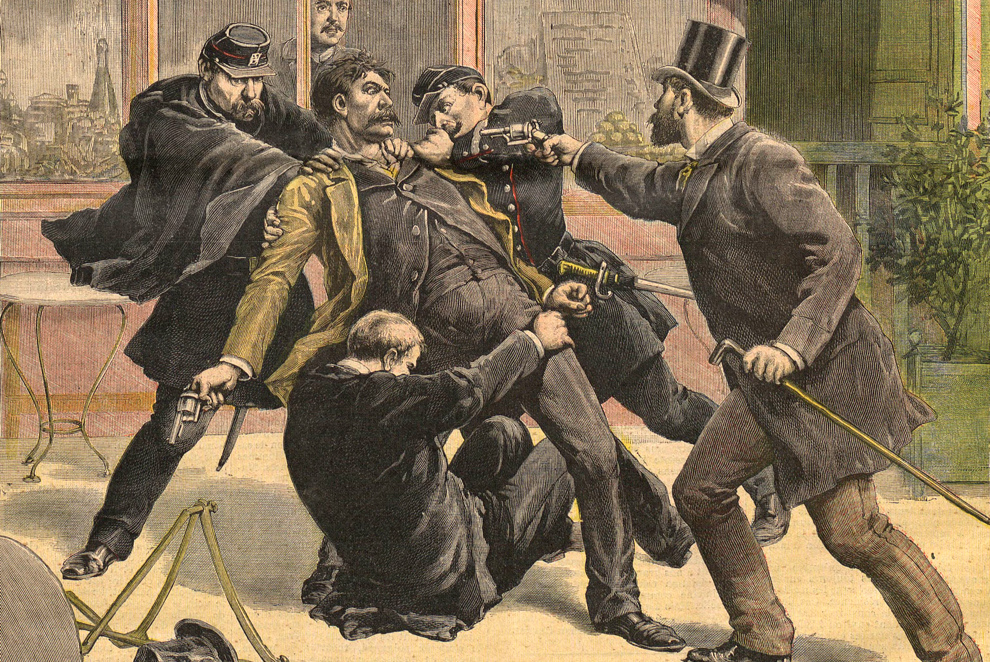Only one positive thought comes out of the slaughter in Paris: that the result will be very different from what the Islamic State predicts. This assertion rests on history as much as belief. ISIS’s jihadists have adopted the methods and the extraordinary aim of another movement, anarchism, which terrified Europe and the United States a century ago. The present doesn’t repeat the past but it always resembles it, and so will the future.
In the twenty years before the first world war, six heads of state were assassinated in the name of that movement: the president of France in 1894, the premier of Spain in 1897, the empress of Austria in 1898, the king of Italy in 1900, the US president in 1901 and another premier of Spain in 1912. The theorists of anarchism preached hatred towards the ruling class and the bourgeoisie alike, and pointed to a glorious future. Their device of choice was the “propaganda of the deed,” striking at the enemy to tear down the existing order.
ISIS reaches out to the kind of people who rallied to the anarchist cause – the lonely, angry and marginalised, aching for something to believe in. Its aim is to overthrow the state and deliver a new age.
The anarchists’ grasp of economics was hazy, but they knew whom they hated; the religious knowledge of most jihadist terrorists is equally hazy, but they, too, are sure of the many targets they feel entitled to attack. The anarchists were fighting against the mighty industrial states that came into being in the nineteenth century; ISIS is seeking to redraw the boundaries of the Middle East created by those same empires.
The anarchists sought to make explicit the division between those who shared the vision and all others who were enemies. ISIS seeks to strike back at the Western powers attacking them and, even more importantly, to galvanise all followers of Islam; its message is that Muslims cannot stay in the “grey zone” of secular societies and Western influences.
The anarchists spoke to a marginal few and repelled the great majority; ISIS is doing exactly the same. The horror pulls in a stream of young recruits while the great rivers of the Islamic world seek to turn away and find other means. While anarchists wanted to abolish the state, ISIS wants to create a new version of a state in its caliphate. The territory it controls is known, as are many of its leaders.
Lashing out at the people of Paris was the action of a state under attack, already losing battles and leaders. The war against ISIS just got very personal for François Hollande; the stakes have been raised and France has a clear target for its anger. The nuclear deal between the United States, Europe and Iran is looking even more like a practical bargain. In war, an unlikely ally is still an ally.
ISIS wanted to kill ordinary citizens because each person attacked in Paris was a symbol of French life and politics and the secular right to decide for yourself. The jihadists had to go after citizens as representatives of the West, or democracy or France because, thanks to the anarchists, it’s a lot harder these days to get through the protective layers to attack a president or premier.
Since the attack on Charlie Hebdo in January, everyone in Paris has understood the idea that any individual is a target. The result is a resigned determination, much like that experienced in London during the IRA bombings. Just as that era introduced Britain’s ubiquitous surveillance camera, so Paris is becoming used to armed guards everywhere. To be in France this summer was to have regular encounters with three-person military patrols, in combat helmets and jackets and carrying automatic weapons, from the big train stations to the grounds of Versailles. (I was on the Paris–Amsterdam fast train on the morning a jihadist travelling in the opposite direction pulled out an AK-47 but was overcome by passengers; in the modern lottery of life, this is the macabre wild card.)
A century ago, the anarchists ended up greatly strengthening the state instruments that confronted them – intelligence, police and security institutions. Al Qaeda’s attack on the United States on 11 September 2001 did the same, giving a huge boost to spending on all areas of security. The much larger and richer Western intelligence community is about to get even more muscle and money.
ISIS is doing a wonderful job on behalf of Western governments confronted by the libertarian critiques posed by Assange and Snowden. The jihadists have gone off the digital grid, abandoning their mobile phones and computers so they can stay in the shadows. In the argument over the balance between freedom and safety in the digital age, Paris will further tip the scales to government and increased security.
ISIS’s actions have presented the choice in the bloodiest and starkest terms. If the question posed is either random slaughter or stronger government, the answer is simple. Forced to choose, the vast majority of people around the world will decide against ISIS, just as they once recoiled from the terrorism of the anarchists. •




